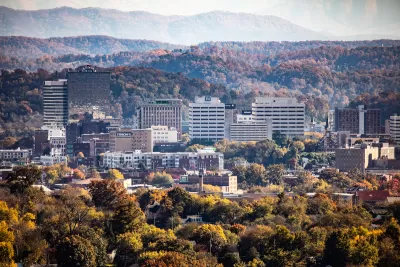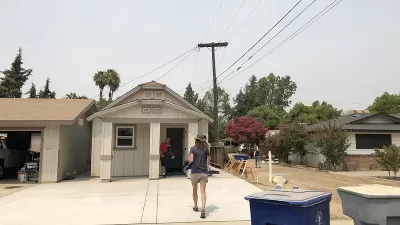With the cost of housing around Knoxville, Tennessee rising, elected officials and political candidates are looking for new ways to allow residential density.

Knoxville Mayor Mayor Indya Kincannon is expected to proposed zoning changes that would make it easier to build missing middle housing.
Silas Sloan reports that the mayor is focusing on residential density as the cost of housing around the Eastern Tennessee continues to rise.
“Kincannon told Knox News the proposed changes are based on a fall 2022 housing landscape study conducted by Opticos Design, a zoning reform consultancy hired by the city and Knoxville-Knox County Planning to identify solutions to the housing crunch,” writes Sloan.
Opticos Senior Associate Tony Perez is quoted in the article saying that vague and outdated language in Knoxville’s zoning code makes it difficult to develop missing middle housing.
“The proposed changes, created in partnership with East Tennessee Realtors, should be presented to the Knoxville City Council and Knoxville-Knox County Planning Commission this fall, Kincannon said, with a goal of finalizing the changes by January 2024,” reports Sloan.
Sloan also adds that R. Bentley Marlow, a developer who is running for the city's council's at-large seat B, has proposed another set of zoning changes that would allow missing middle housing a permitted development, or by-right development, in residential neighborhoods, rather than a special use.
Zoning reforms have been developing in Tennessee for a few years now as the state deals with swift growth and surging housing costs. Nashville reformed its parking requirements, setting parking maximums, in November 2022, for an example of a city achieving legislative reform prior to Knoxville’s explorations of missing middle housing.
FULL STORY: Knoxville's housing crisis could get help by easing path to build duplexes and townhomes [paywall]

Planetizen Federal Action Tracker
A weekly monitor of how Trump’s orders and actions are impacting planners and planning in America.

Congressman Proposes Bill to Rename DC Metro “Trump Train”
The Make Autorail Great Again Act would withhold federal funding to the system until the Washington Metropolitan Area Transit Authority (WMATA), rebrands as the Washington Metropolitan Authority for Greater Access (WMAGA).

The Simple Legislative Tool Transforming Vacant Downtowns
In California, Michigan and Georgia, an easy win is bringing dollars — and delight — back to city centers.

The States Losing Rural Delivery Rooms at an Alarming Pace
In some states, as few as 9% of rural hospitals still deliver babies. As a result, rising pre-term births, no adequate pre-term care and harrowing close calls are a growing reality.

The Small South Asian Republic Going all in on EVs
Thanks to one simple policy change less than five years ago, 65% of new cars in this Himalayan country are now electric.

DC Backpedals on Bike Lane Protection, Swaps Barriers for Paint
Citing aesthetic concerns, the city is removing the concrete barriers and flexposts that once separated Arizona Avenue cyclists from motor vehicles.
Urban Design for Planners 1: Software Tools
This six-course series explores essential urban design concepts using open source software and equips planners with the tools they need to participate fully in the urban design process.
Planning for Universal Design
Learn the tools for implementing Universal Design in planning regulations.
Smith Gee Studio
City of Charlotte
City of Camden Redevelopment Agency
City of Astoria
Transportation Research & Education Center (TREC) at Portland State University
US High Speed Rail Association
City of Camden Redevelopment Agency
Municipality of Princeton (NJ)





























